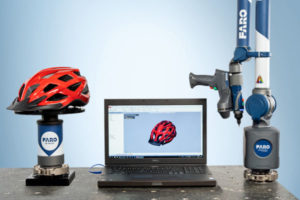Lightweight scanning solution
The Faro 8-Axis Design ScanArm 2.5C is the first colour capable portable lightweight 3D scanning solution providing an unprecedented ergonomic experience with both the 7-Axis or 8-Axis models.
Using the new Faro Prizm™ full colour Laser Line Probe with powerful 3D design and modelling software, the 8-Axis Design ScanArm delivers high-resolution colour point-cloud data enabling more insight into object design and creation, geometry, surface composition and differentiation between materials.
The colour information is also used in high-quality 3D visualisation of rendering objects in gaming, movies and online marketing.
The added eighth-axis enables real-time rotation of the object being scanned – eliminating wasted time, reducing risk to delicate objects and supporting more complete scan output.
The 8-Axis Design ScanArm 2.5C is the ideal solution for any organisation that may have the need to develop or manufacture parts and after-market products characterised by different coatings, materials, co-moulded parts or surfaced finishes without existing CAD models.
In addition, you can reverse engineer legacy parts to design changes or replacement, create digital libraries to decrease inventory and warehouse costs, design aesthetically pleasing free form surfaces or leverage the power of rapid prototyping.
This lightweight and easily manoeuvrable ScanArm is available in lengths of 2.5m, 3.5m and 4.0m and seamlessly scans challenging products, objects and prototypes.
The Design ScanArm 2.5C comes equipped with dual, hot swappable batteries that enable continuous operation with no need for external power when the application requires measurement in the field or shop floor.
Faro kinematic iProbe’s easy connect/disconnect combined with a simplified quick release, makes the device effortless to operate regardless of skill level or 3D scanning experience.
The Faro 8-Axis Design ScanArm 2.5C is the ideal colour capable 3D scanning solution for any organisation that may have the need to:
• Capture and digitise objects and props in full realistic detail for digital visualisation
• Manufacture parts without existing CAD models
• Develop aftermarket products that need to fit tightly with existing products
• Digital archiving and historical preservations
• Reverse engineer legacy parts for design changes or replacement
• Create digital libraries to decrease inventory and warehouse costs
• Design aesthetically pleasing, freeform surfaces
• Leverage the power of rapid prototyping



